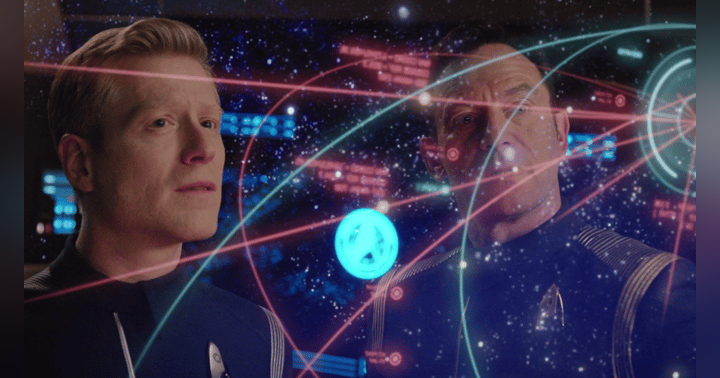Why Leadership is Not Just About Being in Front of the Ship
There is no ‘perfect’ leader. There are many different techniques out there on how you can be a good leader. Foundations of a great leader start with a strong level of emotional intelligence. This is the ability to understand yourself and your own personal leadership styles, strengths, and weaknesses.
With twenty years of experience in executive management and a passion for Star Trek, I have found many reflections of great leadership styles within the characters. Check out and listen to the Starfleet Leadership Academy podcast today to grow and develop your skills in a modern and relatable way. This leadership development podcast will help you lead your team to success.
6 Leadership Styles that You Can Learn from the Starfleet Leadership Academy
There are 6 effective leadership styles that we can take from the characters in Star Trek. Let’s briefly walk through them here.
- Commanding Leader
The antagonistic and powerful approach of the Klingon’s leaders, Gowron, T’Kuvma, and even Kor, are some of the best examples of a commanding leader. This style of leader commands with the use of fright. They can struggle to establish trust with the crew if not careful of how they interact with the team.
- Pace-setting leader
Captain James T. Kirk is a highly effective leader that leads by setting the example. He has a hands-on leadership style and is vocal about how he expects the crew to always do their best. This leader is prepared and always at least one step ahead of the team.
- Coaching leader
The coaching leadership style of Captain Jonathan Archer helps the rest of the crew to recognize their strengths and weaknesses while also teaching and supervising them. This leader builds close connections with the team by being intentional and approachable.
- Affiliative Leader
Captain Kathryn Janeway style is an affiliative leader. She believes that people come first and she loves creating harmony within her organization. An affiliative leadership style is always positive and takes into account all communication styles that are present in the group.
- Visionary Leader
Captain Jean-Luc Picard always motivates the crew members to be the best that they can be. The leader is one who recognizes that success is obtained with and through people. A visionary leader is most effective at the times when a team needs to take a new direction.
- Democratic Leader
With a democratic leader present, everyone has the right to participate in the decision-making. Captain Benjamin Sisko starts in Deep Space 9 as a Lieutenant Commander but always values the voice of his colleagues.
Which Star Trek captain matches your natural leadership style? What lessons can you take from their failures and successes? Learn more about managing your ‘crew’ in my Star Trek-inspired leadership development podcast, the Starfleet Leadership Academy.
How to Cultivate Effective Leadership
As a leader or manager, you must make sure that your motivation to lead matches the situation, your team, and the overall welfare of the organization. My leadership development podcast explains how to gain a deeper understanding of yourself and how you naturally relate to your teams.
You need to find a way to connect with the people you work with in your own unique way. You’ll be surprised how your team blossoms when you are true to yourself and your natural leadership style.
Improving Emotional Intelligence
Effective leadership is about creating successful, meaningful, and professional working relationships with your team. This starts by improving your emotional intelligence which I discuss often in my Star Trek Podcast.
Improve your emotional intelligence by understanding five dimensions:
- Self-Awareness- If you want to understand other people or your team, understand yourself first. Self-awareness allows you to lead with humility and confidence.
- Self-Regulation- Encourage your team by showing strength and discipline in your decisions and in how you speak. A self-regulated leader will practice being calm and held accountable for every action.
- Motivation- Maintaining a strong and persistent drive to reach a goal will help keep you and your team on task. Sometimes, finding new determination can be as simple as stopping as a team to remember the core reasons for going after the goal.
- Empathy- Putting yourself in someone else’s shoes is critical to managing a team or organization. Empathetic leaders have profound listening skills and a desire to truly understand.
- Social Skills- Constantly improve and develop your communication skills with your team. Intentional interactions lead to building relationships that are grounded in trust. This is an integral part of successful leadership.
Conclusion
You are the leader, but you are not a one-person team. The success of your organization is not only about you having a great leadership style and skill. The evidence of successful leadership is how you handle your team and each situation that may arise within your organization.
In my leadership development podcast, I encourage each leader to improve their own emotional intelligence and let the whole team be heard and take their place. We delve deeper into understanding different points of view and how to implement those ideas.
Leadership through cultivating relationships is simple, yet effective and impactful. Listen to the Starfleet Leadership Academy podcast for more great insights.
This post contains affiliate links. I may receive a commission for purchases made through these links but it won't cost you any more.





